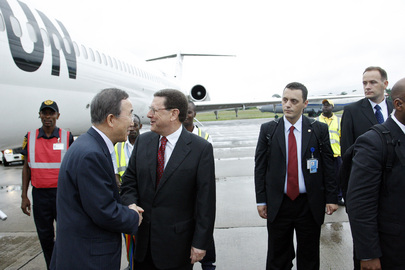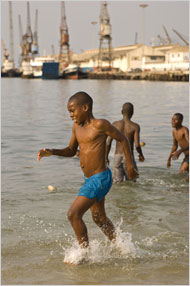In
Somali Chaos, Japan and Germany Offer Separate Training, U.S. Cuts
Aid
By
Matthew Russell Lee
UNITED
NATIONS, December 8 -- Mirroring the chaos of the Transitional
Federal Government in Somalia, donors and vultures and purported
helpers are all working at cross purposes. Among the vultures we
place a company called "Phoenix,"
which brags of having
contracts with the TFG to train security forces in Jordan for
deployment in Somalia. We will have more on this.
Meanwhile
while
the UN claims that it alone is authorized to train Somali forces, a
senior UN official on Tuesday complained to Inner City Press that
Japan and Germany are moving toward doing their own trainings,
outside of Somalia.
This
has reportedly
angered the UN's envoy to Somalia Ahmedou Ould Abdullah enough that
he has traveled to Tokyo. His spokesperson has repeatedly declined to
answer questions from Inner City Press in the past.
Three
top UN
humanitarian managers for Somalia briefed the Press on Tuesday, about
shortfalls in fundraising. Inner City Press asked if they have solved
their dispute with the United States, which slowed aid because
transfers to Al Shabaab would violate U.S. anti terrorism laws. Mark
Bowden, the UN's Nairobi based humanitarian coordinator, confirmed
his talks with "donors," stressing that time is of the
essence.
Inner
City Press
asked Bowden about the UN urging the TFG president not to fire the
police chief of Mogadishu, which nevertheless took place. Bowden
confirmed the UN has concerned, but said they "come from the
political side." Then what is Ould Abdullah doing in Japan?
In
belated
disclosure of how the TFG's parliamentarians were paid, Inner City
Press was told that when the parliament contained 250 members,
countries including the U.S., UK and Norway paid their salaries. When
the parliament swelled to 500, the UN Development Program started
paying, Inner City Press was told. UNDP itself has repeatedly refused
to answer questions about its funding in Somalia.

UN's Ban and Somalia's president, Germany and
Japanese training not shown
Al
Shabaab has
ordered the UN World Food Program to stop importing food, to buy
locally or not bring food in. The Food and Agriculture Organization's
Graham Farmer conceded that bringing in food aid during the harvest
season depresses the prices farmers get.
Does
WFP buy
locally in Somalia? Farmer said WFP tries to buy locally elsewhere,
but does not do so in Somalia. Why not? Watch this site.
Footnote:
Bowden's press conference was delayed, a spokesperson said, because
he was blocked at the UN's visitors' entrance. Afterwards, Bowden
told Inner City Press he showed his pass from the UN Office in
Nairobi, but that this wasn't accepted at the UN in New York.
Ironically, Kentucky Fried Chicken's Colonel Sanders impersonator got
into the building with no problem, but the UN's humanitarian
coordinator for Somalia was stopped...
* * *
UN's
Congo Expert Covers Up for MONUC, Chides Press He Was With Under
Other Name
By
Matthew Russell Lee
UNITED
NATIONS, December 7 -- The coordinator of the ostensibly independent
UN Group of Experts on the Democratic Republic of the Congo appeared
in the UN briefing room on Monday to criticize the Press for focusing
on portions of the Experts' report which show the UN working
with
murderous former rebels engaged in Congo mining.
Video here.
Even
before the
press conference, Dinesh Mahtani on December 4 declined to answer on
the record Inner City Press' questions about the UN's role in
providing logistical support to units of the Congolese army which
were until recently the rebel forces of Laurent Nkunda and indicted
war criminal Jean Bosco Ntanganda.
In
a large
conference call at the German Mission to the UN, filled with an
audience of several dozen, Mahtani said "I can't speak on the
record," and referred Inner City Press to his press conference
on Monday. Dinesh was introduced, by former head of UN Peacekeeping
Jean Marie Guehenno, as having been a journalist in the past.
Guehenno also declined to answer questions.
Three
days later,
when Mahtani took to the UN's rostrum accompanied by an employee of
the UN's Department of Political Affairs, he emphasized that the
Group is independent. He criticized press accounts of his report,
previously leaked to Reuters, BBC and others in Kinshasa, which
emphasized on the findings against the UN.
He
said the
report, now available online here,
is mostly about two groups, the
FDLR and the CNDP, that latter of which has become a part of the
Congolese army. The UN's Mission in the Congo, MONUC, provides
logistical support to these former CNDP units, for example one led by
Innocent Zimurinda, who identified as Zimulinda is charged by UN
Special Rapporteur Philip Alston with murder and multiple rapes.
Inner
City Press
asked Mahtani if he believes the UN should be working for example
with these "Innocent" units. Mahtani replied that his
report mentions Zimurinda several times. But should the UN be working
with him?
From
there, things
got more surreal. Mahtani told one long time wire service
correspondent that her question was "strange." Dinesh
Mahtani, as it happens, reported from the
DRC for Reuters, on other monkey
business, under the
name Dino
Mahtani. Why so defensive?

In Bunia, mine awareness- land mine, that is, Experts not shown
Mahtani
also
defended China, which is named in the report as flying in weapons
without accounting for them to the UN Sanctions Committee. Defending
itself is the company Niotan, identified as a wrong-doer in the
report: it claims it has another name, Refractory Metals Mining
Company Limited. Sort of like Zimulina and a certain Mahtani... To be
continued.
Footnote:
the Report at paragraph 119 zeroes in on a Western Union transfer to
"the program manager of the Ahadi Institute, Edison Bashimbe
Nshombo [whose wife] reportedly administers medical treatment to
wounded FDLR in the region." But, hat tip CanWest, the Ahadi
Institute has as a supporter the UN's own UNESCO, click here for that,
and watch this site.
* * *
As
Congo's Gold Hits 60 Minutes, UN Is Let Off Hook, Wal-Mart's 10%
Solution
By
Matthew Russell Lee
UNITED
NATIONS, November 29 -- The Congo's conflict gold was the
subject of a fifteen minute feature tonight on the American television
program Sixty Minutes. A former rebel said he used collected gold to
buy weapons and ammunition from the Congolese army. A woman said she
was raped by men in Army uniforms.
Sixty
Minutes
accepted UN escort and showed a UN camp, but neglected to mention
that the UN now provides logistical support to the Congolese army,
which beyond weapon sales and rape has been documented for the mass
murder of civilians, by the UN's own special rapporteur and experts.
But the UN's
top envoy to the Congo Alan Doss has
told Inner City Press there is not
enough evidence, and has yet to act on Special Rapporteur Philip
Alston's report detailing mass rape by Congo's Army. (Click here for
coverage of Congo trip by Inner City Press.)
Rather
than at
least mention this perversion of the UN's peacekeeping mandate, Sixty
Minute showed a UN camp to which 13,000 internally displaced people
fled. Bags of flour and beans and cooking oil were distributed on the
day of filming, for the first time in five months.
Neither
Sixty
Minutes nor the two non governmental organizations which appeared on
screen, HRW and the Enough Project, explained the starvation
just outside a UN camp.

UN's Ban and Doss in Congo, continuing support of
rogue Army units not shown
The point of
the show was that just as conflict diamonds were focused on seven
years ago, conflict gold now cries out for action.
Sixty
Minutes said
without explanation that the UN tries to stem the flow of conflict
gold. But if the UN is supporting Army units which rape, kill and
sell weapons, and which themselves control mines, how is the UN
trying to stop the flow?
Footnote:
Back in the U.S., Sixty Minutes quotes Tiffany's as identifying the
source of nearly all of its gold -- in Utah -- while Wal-Mart will only
say
that it will track the source of 10 percent of its gold by next year.
If it were rap music with profanity, Wal-Mart would take action. But
conflict gold from the Congo? Ten percent sourcing, maybe, by next
year...
* * *
IMF
Murky on Angola's Oil, Bond and China Deals, Doles Out $1.4 Billion
By
Matthew Russell Lee
UNITED
NATIONS, November 25 -- Days after announcing a $1.4 billion
arrangement with Angola, the International Monetary Fund held a press
conference call to offer explanations. At the end, things were
murkier than before. Inner City Press asked if the IMF had been able
to fully assess the income and distribution of revenue from the state
owned oil company Sonangol.
The
IMF's Lamine
Leigh, who led the Fund's missions to Angola in August and September,
replied that "in the context of our negotiations, Sonangol
participated fairly well." Inner City Press asked, since
Sonangol has accounts in off shore financial centers and tax havens,
if the IMF had gotten to the bottom of these accounts.
After
a long
pause, Lamine Leigh proffered another answer, that the government has
"committed to steps in the more general area of resource revenue
transparency." But what about the Sonangol accounts?

Oil in Angola, Sonangol's accounts not shown
Inner
City Press
asked about the statement
by IMF Deputy Managing Director and Acting
Chair Takatoshi Kato that in Angola "measures will be taken to
strengthen further the regulatory and supervisory framework."
The IMF's Senior Advisor on Africa Sean Nolan replied that the IMF
analyzed the effect of the exchange rate on borrowers and "on
the banks."
In
fact, Angola's
government has gotten billions in pre-export oil loans from, for
example, BNP Paribas, Standard Chartered and Deutsche Bank. The
latter has made similar loans in Turkmenistan, assailed by
transparency and human rights advocates. How much of the IMF's new
arrangement benefits these banks?
In
fact, the
questioner after Inner City Press, cutting off follow up, was from
Standard Bank. Other than Inner City Press, the only other media
questioner was from Reuters.
Before
the call
ended, Inner City Press was able to ask about Angola's reported $4
billion bond sale planned for December. Sean Nolan said that the
IMF's "understanding" with Angola does involve a
"fundraising effort," but that the timing was not agreed
to, the IMF does not "micromanage" to that extent. Nolan added
that there is an agreement on an "overall limit."
"Is
it four
billion dollars?" Inner City Press asked.
Nolan
replied that
the precise limit will be "clear in the documents," which
have yet to be released. Why play hide the ball?
Nolan
praised the country for "appointing reputable financial and legal
advisers for the transaction" -- JPMorgan Chase will be the manager.
Nolan
continued
that the actual size of the bond sale will depend on how much
"concessionary lending" Angola gets from "countries
with a strong record of financial support to Angola."
Inner
City Press
asked if the size of China's loans to Angola -- China gets 16% of its
foreign oil from Angola -- were known by the IMF or considered.
"That
hasn't
figured in our discussions," the IMF's Nolan responded. Why not? Watch
this site.
* * *